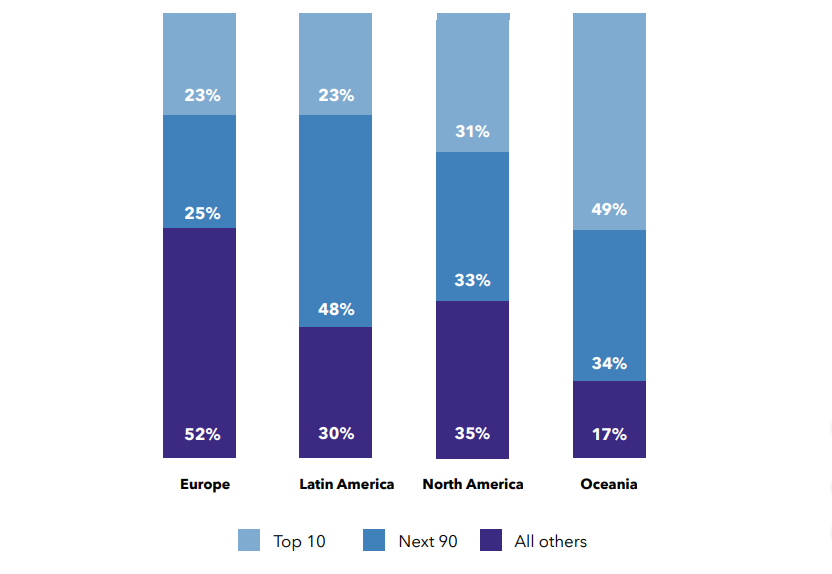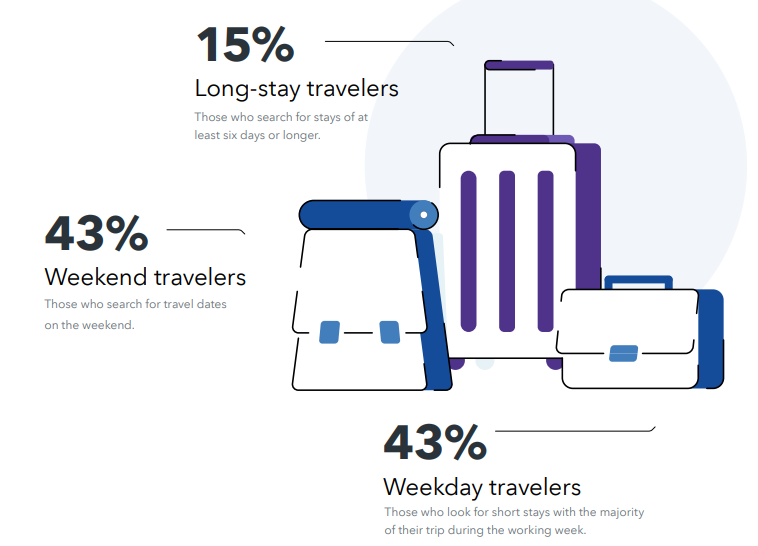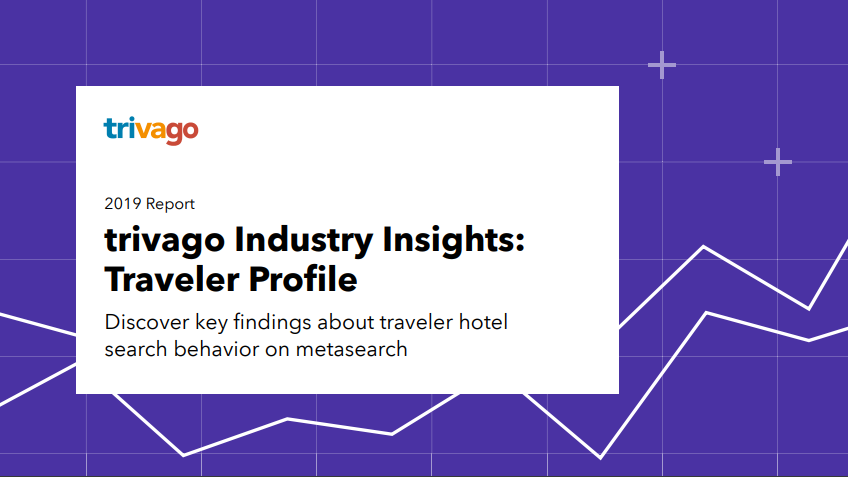This translates into millions of searches that give leading platforms an enormous amount of data about traveller behaviour. Trivago, one of the leading global hotel metasearch engines, has used these insights to examine when its users search for a hotel, which factors narrow down their search options, what prices they pay, how much they are prepared to pay, and their hotel-stay patterns.
Its white paper 'trivago Industry Insights: Traveler Profile' - analysing 2018 travel - reveals that while there can be a lot of focus on the top destinations, less typical destinations also attract a significant number of travellers. In fact, more than half (52%) of its users travelling to Europe choose destinations other than the region's 100 most popular places, while in Oceania, the top 10 destinations account for 49% of all searches made for the continent on the platform, the largest share for this area across the world.
CHART - Travel to the top 100 destinations make up a significant majority in all regions except travel to Europe, where a majority (52%) goes to destinations outside the top 100 Source: trivago Industry Insights: Traveler Profile
Source: trivago Industry Insights: Traveler Profile
The research shows the source of the majority of travellers to all regions is domestic, in particular in Latin America and Oceania where domestic travellers are the dominant travel source. However, within Europe there is a significant amount of travel between European countries (36%). In North America there is a greater amount of travel coming from other continents, mainly Europe.
CHART - Overall short stays make up the majority of travel, equally split between weekends, but long-stay travel, albeit representing a smaller scale in numbers, represents a highly valuable share of travellers Source: trivago Industry Insights: Traveler Profile
Source: trivago Industry Insights: Traveler Profile
But it is the search filters available to users that provide a real insight into what is most important to travellers when looking for a hotel. The research reveals price (54%), star rating (29%), guest rating (21%) and top amenities (15%) were the most used filters and therefore the most important factors in deciding on the ideal hotel.
Looking more closely at the price function and the search data shows that the average price that travellers select using the price filter is generally higher than the average price they end up selecting, suggesting they look at options up to their maximum budget and then look for the best cheaper option. Latin America was the only region where the price filter (EUR99) was close to the average click-out price (EUR95). North America had the highest average filter (EUR178) and clicked prices (EUR148).
When travellers looked at hotel quality, those who used the filters tended to focus on higher quality accommodations. The most popular choice for star rating was for four stars or above with 37%. Overall 87% of those using the filter selected one of the options for 3 stars or higher.
MORE INSIGHTS... discover more findings about traveller hotel search behaviour on metasearch Trivago Industry Insights: Traveler Profile
Trivago Industry Insights: Traveler Profile
For guest ratings, a positive review is seemingly worth much more than a negative one, with the research highlighting that 46% selected to filter only to those hotels with an "Excellent" rating, and 78% to include either "Very good" or "Excellent." When looking at the top amenities that travellers looked for, the most popular was an included breakfast with 33% of those who used the top amenities filter selecting it. A hotel pool and free WiFi were the second and third most popular amenities.
The data highlights clear regional variations in length of stays. Travelers in all continents stayed on average around 3 nights, with those in Oceania slightly fewer at 2.7 nights, and those in Europe and Latin America slightly longer at 3.4 and 3.5 nights respectively.
It also shows clear seasonality in parts of the work with Europe having "the most distinct seasonal travel trend," with a busy summer season. North America also shows a summer peak, Latin America had two travel peaks, one in December and January, and the other in July, while Oceania did not show a clear seasonality.
The analysis also identifies that on average travellers booked 51 days in advance of their stay. In all markets of the world December travel was booked further in advance, with an average of 59 days. The busy summer period in Europe was also above average with travel booked on average 56 days in advance.